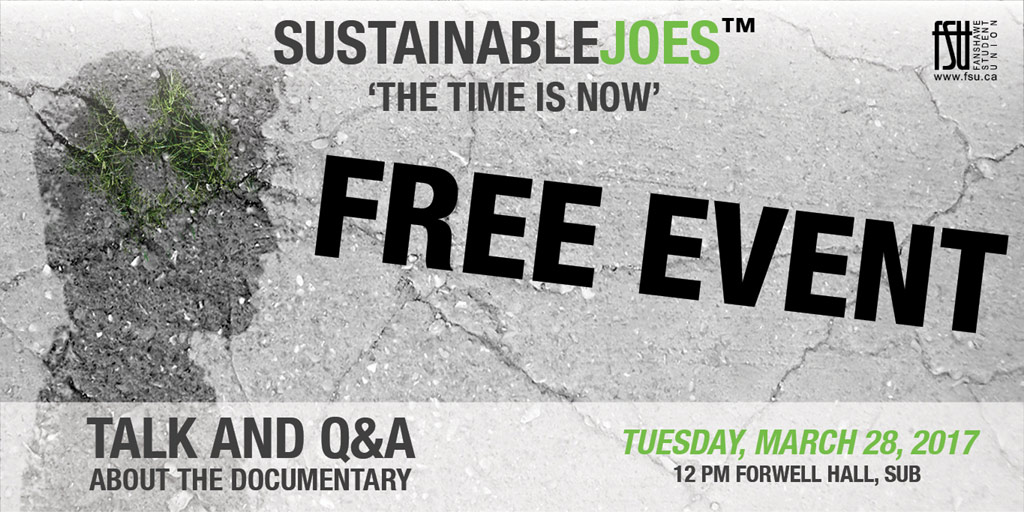Sustainable Joes: Rethinking sustainability
 CREDIT: DESIGN BY SIMON DUNFORD
CREDIT: DESIGN BY SIMON DUNFORDOn Tuesday, March 28 in Forwell hall, Stephen Szucs will be answering questions and talking about his documentary Sustainable Joes - The Time is Now.
Stephen Szucs founded Sustainable Joes in 2013 when he started his ‘living-off-the-grid’ adventure to find sustainable solutions for everyday individuals.
“I believe that we have to move our world towards a more sustainable direction if we want to make sure that our further generations are able to enjoy the privileges that we did,” Szucs said.
Szucs moved to London shortly after he worked at a solar company in Southwestern Ontario. He was always interested in the environment, sustainability and stewardship and used to always think about solutions to live in a way that would help protect the biodiversity that is essential to life.
Szucs, with his then roommate, decided to try out this type of adventure for a summer and search for sustainable solutions for ‘everyday joes’. The project, that was supposed to last for three months, ended up becoming a year-long journey for Szucs after his roommate moved out.
“I always wanted to journey around the world, highlighting sustainable difference maker,” Szucs said.
In the second year, with the help of his friend’s boss who was willing to sponsor him with the gear, Szucs cycled across the country living off-the-grid to find a group of individuals who shared his passion of living a sustainable life. He filmed his journey to make a documentary where he recorded the experiences with all the people that he met during his journey who supported him in his mission.
“I’m not sure that all future generations will have the necessary natural resources,” Szucs said. “The root of sustainability to me is not business, environment or going green, it’s ultimately the survival.”
Living off grid for such a long time brought many challenges to Szucs. The difference was in the types of challenges that they were.
“I had never lived off-the-grid before, so in the first year, my challenges were mainly arising out of discomfort,” Szucs said. “I wasn’t able to produce enough electricity to boil water and that was frustrating.”
In the second year when Stephen started his journey of cycling across the country, the challenges that he faced were not as aesthetic. He was more concerned about things like where he would be staying or the schools or colleges that he was going to engage with and how they would receive him.
“I like to be more calculated than I was on this journey,” Szucs said. “With making any other kind of a movie, we have a script which would tell us what is it that we would be shooting or saying. But with a documentary, I had to see what people say. So I had to be more reactive than proactive.”
With a huge responsibility of talking to people, filming them the way they say it and then telling the story in a way that would honour the words in the way they meant it to sound, Szucs is back from his journey editing the documentary.
“I can make somebody look like a hero or a villain. That’s a huge responsibility,” Szucs said.
There are few things that Stephen practiced during his journey that everyone can adapt in order to live more sustainably.
Water consumption
We use a tremendous amount of water everyday and that is not just the water from tap. We use a lot of water in the food that we consume and it would make a large difference if we are mindful of the consumption and the wastage of water.
Garbage
We create a lot of waste everyday and believe we are mindful of the slogan reduce, reuse and recycle. It is like a pyramid where we think we would reduce a bit on the top, reuse a little bit and recycle everything else, but according to Szucs, it would be a lot more effective if the pyramid was flipped upside down. So that way, we reduce as much as we can proactively, then reuse and then recycle what is left.
“I kept my garbage in the house for a year. So when I went out to purchase anything, I would always think, do I need this bad enough to keep any waste from this in my house?” Szucs said.
Mindset
The mindset shift is what counts the most. Ignorance is not always bliss because it is sometimes a temporary solution. Looking at a bigger picture, it might get lethal. There might be opportunities everywhere from fashion, to transportation, to food, to energy, to water for people to be sustainable, it’s just recognizing the opportunity and taking it. A strong example of this is when Harry Potter star Emma Watson sported a recycled dress at a red carpet event, where she absolutely rocked it.
“It’s basically differentiating between what’s good for me and what’s good for me right now,” Szucs said. “What we don’t understand sometimes is that we would need 4.6 Earths to survive if an average person lives the way they do right now. And we have only one earth.”
On Tuesday, March 28 in Forwell Hall, Stephen Szucs will be answering questions and talking about his documentary Sustainable Joes- The Time is Now. This will be a free event for all students.














